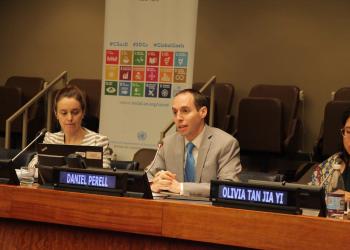BIC representative delivers remarks at opening of Commission on Social Development
Watch the video here.
The following remarks were delivered by Daniel Perell, Chairperson of the NGO Committee on Social Development and Representative of the Baha’i International Community to the UN and at the opening session of the 58th Session of the Commission on Social Development at the United Nations.
Thank you Mr. Chairman and good morning.
Mr. Chair, Mr. Under Secretary General, distinguished colleagues and friends,
This year of anniversaries at the United Nations provides us with an opportunity for deep and thoughtful reflection.
And this is the first Commission of the year, the first opportunity to consider what has contributed to progress made in recent decades. What will be required to overcome the challenges—and seize the opportunities—that lie ahead?
Twenty-five years ago, the World Summit on Social Development took place at the height of optimism about the future of the international order. Its landmark Declaration advocated principles that remain unsurpassed today:
That “social development and social justice are indispensable for the achievement and maintenance of peace and security.”
That “societies must respond more effectively to the material and spiritual needs of individuals, their families and the communities in which they live.”
That all individuals, especially those living in poverty, should “exercise the rights, utilize the resources and share the responsibilities that enable them to lead satisfying lives and to contribute to the well-being of their families, their communities and humankind.”
Since that time, sustained progress toward the Declaration’s central objectives of eradicating poverty, unemployment, and social exclusion has remained stubbornly elusive.
A fundamental question thus faces those of us committed to the vision of social development: what will be required to overcome the obstacles that stand in the way of realizing those noble aims and aspirations?
The drafters of the Declaration knew that the progress of any society cannot be divorced from the health of the relationships that sustain it—between individuals, communities, institutions, and nations.
Today, those relationships unfold in a context of unprecedented interdependence. Challenges are increasingly planetary in scope. And growing numbers have therefore concluded that humanity ultimately rises or falls as a single global family—and that the good of the part is now most lastingly and reliably achieved by working for the good of the whole.
Awareness of this reality is growing, particularly in certain specific areas like climate change and environmental circles as well as among the children and youth of the world. Yet UN spaces are often characterized not by recognition of our common humanity and our shared destiny, but by a culture of negotiation where national interest is paramount. Such an approach, though a commendable advance 75 years ago, is seeing its limits to adequately address the myriad challenges we face today.
Reversing these trends will require those of us who enjoy the privilege of walking the halls of the UN to tend to others’ needs as carefully as our own—including the needs of future generations.
This, to me, is the heart of what the Copenhagen Declaration was saying.
Its authors, advantaged as they might have been, were able to draw on the spirit of that historical moment to give voice to the well-being of populations who, up to that point, had received little attention.
To transform personal and national motive is essential, and it will need to be accompanied by an equally robust transformation of institutional systems and structures.
For many, inaction on global inequalities fueled by the continuing inclination to accumulate more material resources than perceived rivals is emblematic of the limitations of the current order. Arrangements of all kinds will therefore need to be re-imagined in the context of humanity as a single, albeit diverse, whole each part contributing to its functioning and each deriving benefit from its well-being.
The vital spirit of universalism and human solidarity that infuses the Copenhagen Declaration makes clear that commitment to the oneness of humankind, with all its attendant implications, must be the starting point for all deliberations truly concerned with promoting the wellbeing of humanity.
This is the necessary foundation for lasting progress.
Dear colleagues, this year’s Commission is, for the first time, squarely addressing homelessness, a challenge facing countless communities around the world. The Civil Society Declaration, involving input from civil society the world over, makes two clear requests:
The first is to adopt a clear and universal definition of homelessness. Without such a definition, it is hard to measure, analyze, and assess homelessness in a given area. It is even more difficult to ensure that learning and insights generated in one community can be applied to another. The definition we propose is based on that which came out of the Nairobi Expert Group meeting held in May of 2019.
The second request is to develop standardized measurements of homelessness. Without this, academic studies, and policy evaluations are nearly impossible across jurisdictions.
I would encourage you to read the declaration in full.
In conclusion, this Commission focuses its inquiry on advancing the circumstances of those left furthest behind and we commend the work done thus far in this regard.
However, in light of the circumstances in which the world finds itself, we wish to encourage Member States to find ways to use the tools at hand such as this body, which could and should be called upon to do much more. And to take advantage of this 75th anniversary to consider new approaches to accelerate the implementation of Agenda 2030 and to contribute to the decade of action and delivery for sustainable development.
I thank you.
